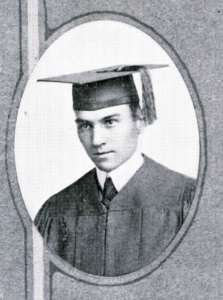As a young man, Karl Keller was interested in electricity and communications. The November 6, 1913 issue of the Kinsley Graphic, reported that Karl, at age 13, had visited James Wolfe to see the “inter-wireless telegraph communications” between Lewis and Kinsley. If you are like me and do not know what that is, it is the transmission of telegraph signals (i.e. Morse code) by radio waves, not through a telegraph wire.
Karl went on to graduate from Kinsley High School in 1917. That fall he planned to attend the University of Michigan to pursue a course in electrical engineering. Instead, he enlisted in the United States Navy and attended the Navy Radio School at Harvard University in Cambridge, Massachusetts. He was assigned to the Battleship Mississippi in March, 1918. He would serve aboard that ship for most of his tour which lasted until July, 1919. He wrote many letters to his mother, Mattie Timkin, and they appeared in the newspapers.

In a letter published in the Graphic on August 29, 1918, he describes life aboard ship as not always being pleasant. On one particular night, “…it was so hot we could hardly sleep out on the decks. About 11:30 we were awakened by lightning and wind and had to move in and nearly smothered after the ports were closed.” He goes on to say “Our main radio station is out of commission. When we get it all fixed up again it will be much nicer than to stand watches below the decks where it is hot as ‘blitzer.’ However, we are standing only a two hour watch at a time now. It is impossible to stay there much longer at a time. My ears get so sticky and sweaty to have the telephones on. Every fellow in the radio bunch has a cleaning station. “
In the same letter, he recounts a near tragedy. “This morning I was told one of our picket boats with ten men were lost. The boat was coming along the ship to get out of the gale, but someway or other they lost the rudder and drifted out to sea. One of the signal boys who was in the boat has told me all about it. He said the waves were mountain high and the boat rocked like an egg shell. They sent up rockets until they had no more. All the time the boat was drifting out to sea. This boy said he sure said a few prayers for he thought they would never be saved. Early this morning we got under way and searched for them. We finally found them. All were there but they looked sick. I don’t have any picket boat duty.”
One other incident he describes happened on August 4, 1918, one hundred miles off the Virginia coast. “I guess it will be all right to tell you that I heard my first S.O.S. call on this cruise. A tanker, O. B. Jennings, was gunned by a submarine off the coast. That night in the press we found out she was sunk, however, all were saved. There is another incident where the radio has saved lives.”
